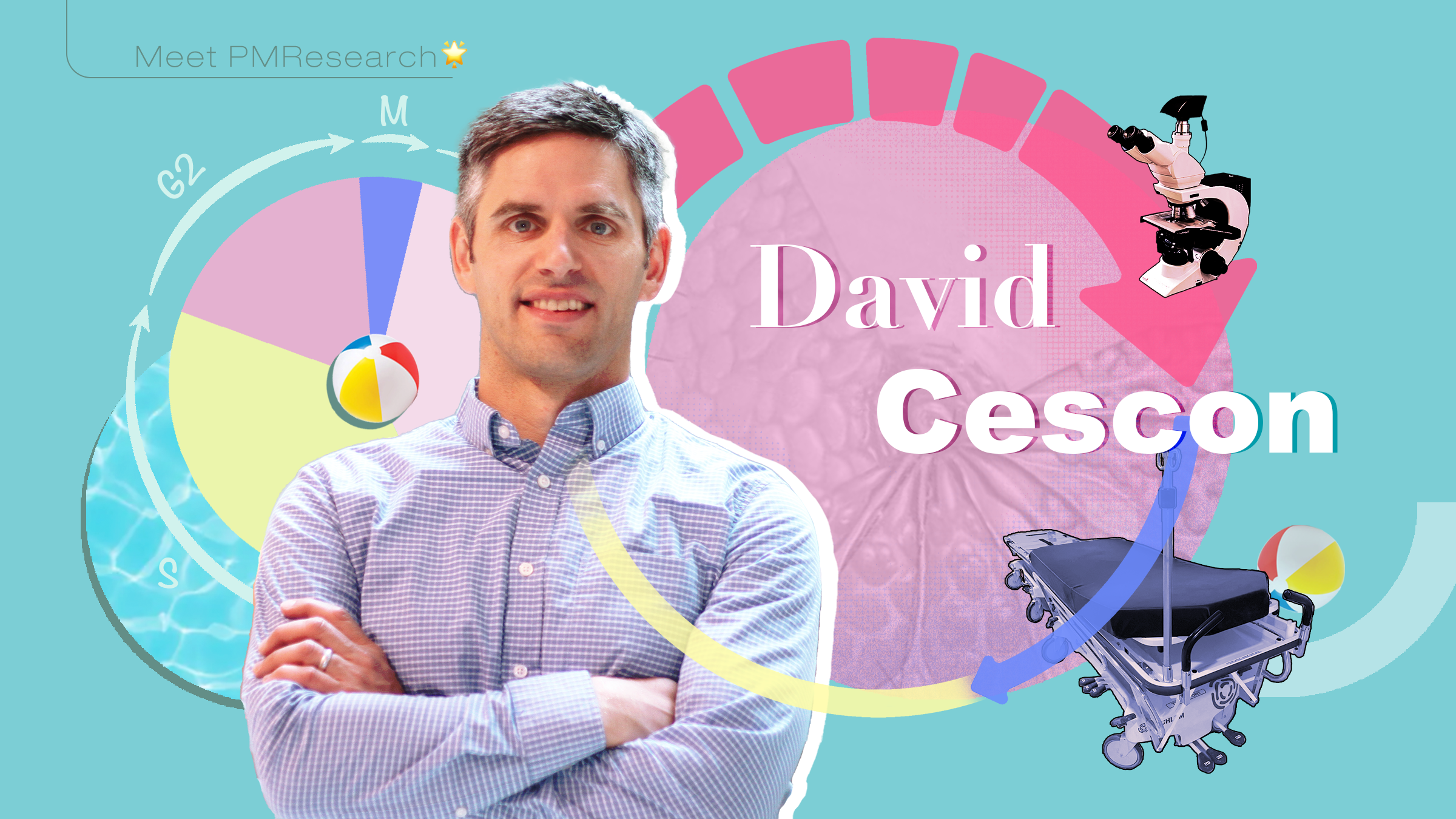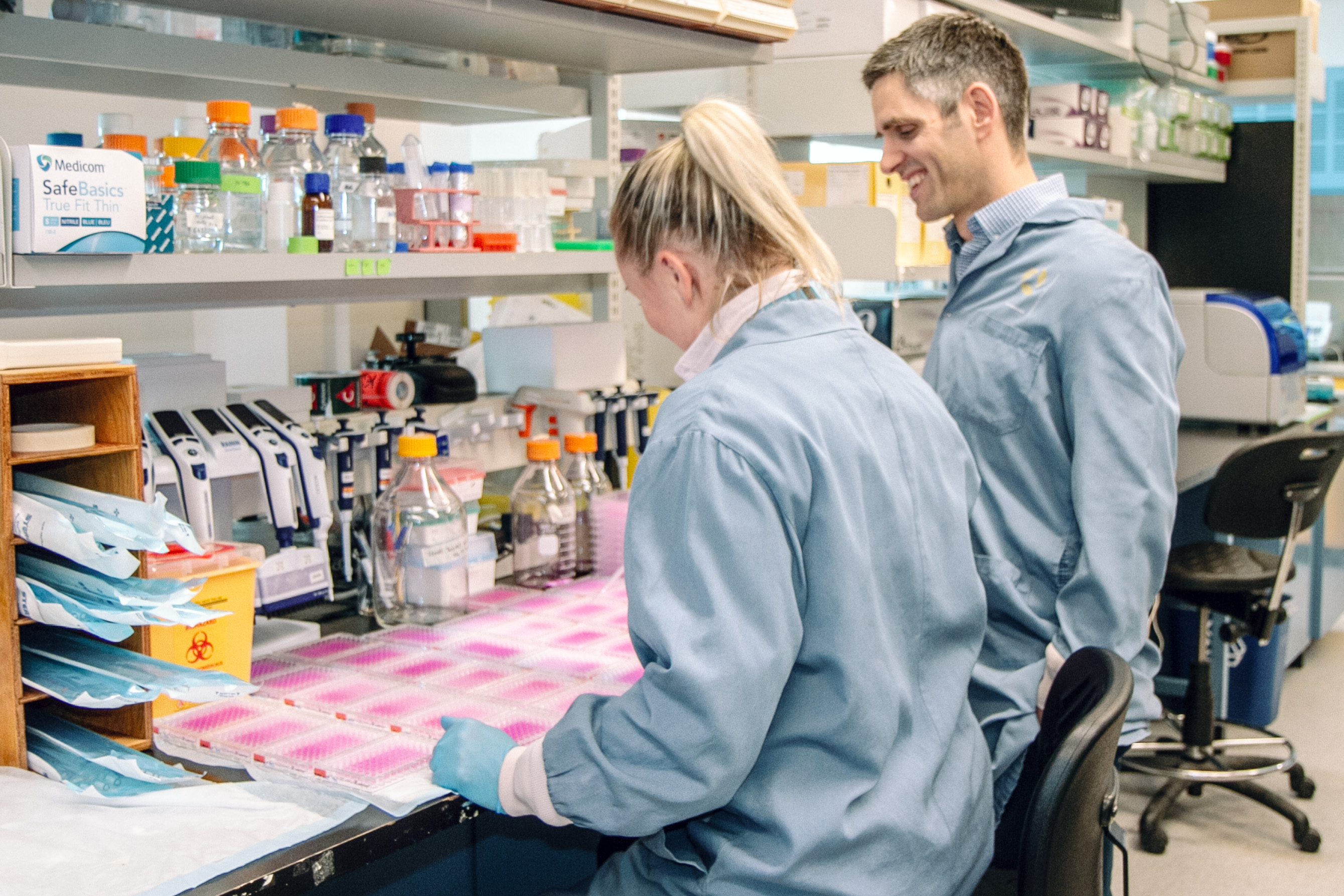
The drive to translational research
If you want to learn how to start a clinical study, David Cescon is the right person to ask.
In the past four years, Dave has helped kick-start five clinical studies—one observational study and four phase 2 clinical trials—as either the Principal Investigator or Chair. He also holds leadership roles in multiple Phase 3 trials sponsored by academic partners (i.e., the Canadian Cancer Trials Group) as well as industry partners.
Dave is a Medical Oncologist and a Clinician Scientist. As an oncologist, he works in the clinic and treats patients two days a week. Many of his patients have metastatic breast cancer, and are often referred to participate in clinical trials being conducted through the Breast Medical Oncology Clinical Trials group. Apart from clinical research, he also leads a wet lab that investigates breast cancer therapeutics and biomarkers. The outputs from his lab often inform and drive his clinical work.
“The activities we do in the clinic and in research enable a self-sustaining bench-to-bedside cycle,” says Dave.
Dave became interested in the health sciences at an early age. He was exposed to laboratory research in organic chemistry as a high school co-op student and enjoyed working in several labs during his undergraduate studies. Through medical training, continued research, and his mother’s influence as a palliative care physician, Dave chose oncology as his clinical specialty.
“I witnessed oncology patients receiving treatments that benefited some but not others. There was an evident urgency to address this, and many opportunities to investigate how we can improve cancer treatments and their delivery,” says Dave. “At the time when I chose my specialty, medical oncology was at the forefront of connecting scientific and clinical problems. That’s what attracted me to the field, and the continued emphasis on translating discoveries into clinical impact is what motivates me as a clinician scientist today.”
Dave attributes his re-entry to the lab following his medical oncology training to a fortunate encounter. “I met Drs. Tak Mak and Lillian Siu over breakfast at a workshop, and the conversation we had led me to another 5 years of clinician-scientist training towards a PhD and Drug Development fellowship at Princess Margaret.”
When asked about the crucial elements that enable translational work, Dave listed two key elements: “One, you need to be in a position where you have a real time view of how things are changing and what’s going to be needed in the clinic—it gives you the problem context. And two, research efforts need to be tuned precisely to where they will have impact. The greater the potential impact, the greater the likelihood of eventual translation.”
Tackling current problems in breast cancer
To understand how we can conquer breast cancer, we first need to know the four stages and characteristics of breast cancer.
When the cancer is restricted to the breast region and nearby lymph nodes, it is considered to be in its early stages (stage I to stage III), and it can be primarily removed by surgery. If some cells escaped the primary tumour, there is a risk that the cancer may recur.
When the tumour has already spread to other parts of the body, it means that the cancer is metastatic (stage IV), which is generally not curable. The breast cancer cells may have different receptors on their surfaces, like the estrogen receptor (ER) and the human epidermal growth factor receptor 2 (HER2), which are the main way physicians classify and treat biologically distinct subtypes of breast cancer.
Therapy resistance in metastatic breast cancer
For patients with metastatic, ER-positive breast cancer, hormone-based treatments have been the foundation of initial therapy. Over the last 6 years, three cyclin-dependent kinase 4 and 6 inhibitors (CDK4/6i) have been approved, which have substantially changed the treatment landscape, by providing better disease control and prolonging survival. However, these therapies eventually become ineffective as tumour cells evolve and become resistant to these drugs.
At the time when CDK4/6 inhibitors were making waves in the field, Dave was completing his PhD with Dr. Tak Mak at the Princess Margaret Cancer Centre and helping to develop new breast cancer therapies that target cell cycle processes. Recognizing the problem that CDK4/6i-resistant breast cancer posed, he set out to investigate new ways to overcome this resistance, with a hunch that the downstream cell cycle inhibitors could play a role.
Dave and his team found that the subset of tumour cells that become resistant to CDK4/6i also undergo several genetic alterations. These alterations not only give rise to drug resistance, but more importantly, they cause tumour cells to become more susceptible to errors during cell division. Therefore, it would be expected that drugs that target these cell division defects might kill the resistant tumour cells. Indeed, the team demonstrated this with CFI-402257, a cell cycle checkpoint inhibitor that was discovered by the Campbell Family Therapeutics Group at Princess Margaret. Their results showed that the drug was successful in causing cell death and helped overcome drug resistance. Their study was published in Science Advances in 2022, and preliminary results from a trial of CFI-402257 in this patient population have shown promise.
The drug CFI-402257 is now being developed by the UHN spin-off company Treadwell Therapeutics as the second line therapy for metastatic ER-positive breast cancer that has become resistant to CDK4/6i. CFI-402257 was granted fast track status by the U.S. Food and Drug Administration—a designation for new therapies that target a specific area of clinical need.
Another angle to tackle the resistance challenge is to improve our understanding of how a patient tumour acquires resistance to drugs over time. “This means that we would need a sample of the tumour at the moment it becomes resistant,” Dave explains. “It’s challenging in the clinic to take a biopsy of a tumour at multiple time points, as it’s an invasive procedure with the risk of complications.”
Thankfully, with the development of what is referred to as liquid biopsy, scientists can now detect and analyze tumour DNA from patient blood samples. Supported by the UHN LIBERATE program, Dave has led several studies to characterize liquid biopsy assays in early and advanced breast cancer. With those learnings, Dave’s team, in collaboration with the Canadian Cancer Trials Group, has launched a clinical trial to characterize drug resistance using liquid biopsy. “We can now comprehensively assess patients' tumours and monitor the progress of evolving resistance. We believe this will allow us to stratify patients and match them with therapies that are better tailored to them as individuals.”

David Cescon and Jennifer Silvester evaluating response to novel drug combinations in CDK4/6i resistant breast cancer cell lines.
Cancer recurrence in early-stage breast cancer patients
For early-stage breast cancers, patients primarily undergo surgery to remove the tumour, but there is a chance that the cancer may relapse (i.e., return at a later date). Drug-based treatment is given to reduce this risk.
“What has been missing here is the ability to predict precisely for an individual whether the cancer will return,” says Dave. “If we can detect the very early signals of recurrence, then we can intervene and may be able to tailor therapies to stop metastatic relapse before it occurs.”
The ability to predict recurrence has been greatly improved with the emergence of the liquid biopsy technique. Recent observational studies, including work led by Medical Oncology resident Dr. Mitchell Elliott under Dave’s supervision through the LIBERATE program, show that, for patients who have completed standard therapy, if there's detectable circulating tumour DNA in the blood, the cancer will likely recur.
Dave’s group, in partnership with the Princess Margaret NIP-IT program and supported by a grant from the Ontario Institute of Cancer Research, is now working on preventing recurrence for early-stage HER2-positive breast cancer patients. In a clinical study initiated in 2022, the team has been testing the use of the targeted HER2 kinase inhibitor Neratinib as an additional preventative treatment for specific individuals with positive liquid biopsy results.
One step at a time
While making strides in treating breast cancer, Dave realized that many skills he uses in research were acquired from his early exposure to playing sports. As a varsity swimmer and water polo player, he juggled his time between medical school and sports training, which turned out to be an essential skill to balance his clinical and research career.
“I also learned that the training I do every day is not necessarily going to be successful, but I have goals to work towards, and little by little, they can eventually lead to advancements.”
The co-existence of competition and collaboration is also similar between sports and research. “To me, the idea of competition is not beating other people—instead, it’s everyone working to their greatest potential, pushing their limit and delivering maximal impact. All of these achievements we have made are the result of teamwork, collaboration and great mentorship,” says Dave. “I feel lucky to be a part of that, and it’s very exciting and rewarding to see that my kids are also taking an interest in competitive swimming, and learning the life skills that will benefit them in the future.”
Meet PMResearch is a monthly column that features Princess Margaret researchers. It showcases the research of world class scientists, as well as their passions and interests in career and life—from hobbies and avocations to career trajectories and life philosophies. The researchers that we select are relevant to advocacy/awareness initiatives, or have recently received awards or published papers. We are also showcasing the diversity of our staff in keeping with UHN themes and priorities.




